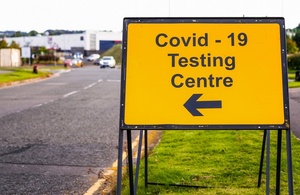Further support for Birmingham, Blackpool, Cheshire East, Cheshire West and Chester, Liverpool City region and Warrington to tackle Delta (B1.617.2) variant
This follows the introduction of further support in Greater Manchester and Lancashire last week

- Enhanced support package aims to suppress the spread of the Delta variant, and break chains of transmission
- Approach has been working in South London and Bolton, stopping a rise in the number of cases
Additional support including surge testing, tracing, isolation support and maximising vaccine uptake, will be rapidly deployed in Birmingham, Blackpool, Cheshire East, Cheshire West and Chester, Liverpool City Region and Warrington.
Further support for these areas follows extensive COVID-19 surveillance and, thanks to the UK’s world-leading genomic sequencing capability, has detected a number of cases of the Delta (B1.617.2) variant in these communities. The new support is the same package confirmed for Greater Manchester and Lancashire last Tuesday, and in Bolton which has since seen a decrease in cases.
Testing, isolation and vaccinations will help suppress and control the spread of the virus and variants in both the short and longer term, when used in combination with people following existing guidance such as hands, face, space and fresh air.
As part of the enhanced support package, extra guidance will be set out for the 6 areas on steps people can take, such as minimising travel in and out of the affected areas, to keep their loved ones and their communities safe. The guidance is the same as that already set out for 8 areas including Greater Manchester and Hounslow.
Introduction of this additional support will be led by local authorities to ensure the right steps are taken at the right time.
Support available to local areas will include:
- additional resources to help local authorities with testing, logistics, planning and workforce to assist with testing, door-to-door visits to engage with residents and other activities – these may come from the Surge Rapid Response Teams, from military aid or other sources depending on requirements
- wastewater testing samples being prioritised for sequencing
- specialist communications support to increase awareness and focus engagement with disadvantaged groups
- maximising vaccine uptake by expanding existing channels, developing new capacity and increasing local and targeted communications to reach different communities
- supervised in-school testing and discretion to reintroduce face coverings in indoor communal areas and classrooms in schools if they and directors of public health decide it is appropriate
- surge testing and enhanced contact tracing
- enhanced monitoring (genomic sequencing, genotype assay testing)
Health and Social Care Secretary Matt Hancock said:
We are doing everything we can to stop the spread of the Delta variant, and working with local authorities, we are providing a strengthened package of support in areas where cases of the variant are increasing.
We know this approach has made a real impact in South London and in Bolton where we have seen it stall rising cases.
I urge people living these areas to get tested, come forward for your vaccine as soon as you are eligible and make sure to get the all-important second jab – that is how we will beat this virus.
Chief Executive of the UK Health Security Agency, Dr Jenny Harries, said:
The Delta variant is now the dominant strain across the UK, with cases continuing to rise in some areas. People in these areas can help protect their community by remaining cautious, by working from home if possible and remembering to practise hands, face, space and fresh air.
Getting the vaccine gives a strong level of protection against this variant and I strongly recommend that everyone gets both jabs when the NHS invites you – it will protect you and your loved ones.
Early research shows that vaccines provide strong protection against the new variants. Effectiveness against symptomatic disease from the Delta (B.1.617.2) variant is similar after 2 doses compared with the Alpha variant (B.1.1.7), and even higher levels of effectiveness are expected against hospitalisations and death.
The government and its world-leading scientists are closely monitoring the evolving situation and the rates of variants, and will not hesitate to take additional action whenever necessary.
Further details about the measures in each area are being made available through individual local authorities.
Background information
The areas covered by the additional measures will be:
- Birmingham City Council
- Blackpool Council
- Cheshire East Council
- Cheshire West and Chester Council
- Liverpool City Region Combined Authority (Halton Borough Council, Knowsley Metropolitan Borough Council, Liverpool City Council, Sefton Metropolitan Borough Council, St Helens Council and Wirral Borough Council)
- Warrington Borough Council
Further support was announced on Tuesday 8 June in Greater Manchester and parts of Lancashire.
Further support was also confirmed for Bedford, Blackburn with Darwen, Bolton, Burnley, Kirklees, Leicester City, Hounslow and North Tyneside.
Genotype assay testing is a new technology which helps identify mutations linked to variants of concern, announced by the Department of Health and Social Care on 22 March 2021.
Public Health England (PHE) published its study into the effectiveness of vaccines against the Delta (B.1.617.2) variant on 22 May.
The study by PHE found that between 5 April and 16 May:
- the Pfizer/BioNTech vaccine was 88% effective against symptomatic disease from the Delta variant 2 weeks after the second dose, compared with 93% effectiveness against the Alpha variant
- 2 doses of the AstraZeneca vaccine were 60% effective against symptomatic disease from the Delta variant compared with 66% effectiveness against the Alpha variant
- both vaccines were 33% effective against symptomatic disease from Delta 3 weeks after the first dose compared with around 50% effectiveness against the Kent variant
Updates to this page
-
Added link to (COVID-19) Coronavirus restrictions: what you can and cannot do page.
-
First published.